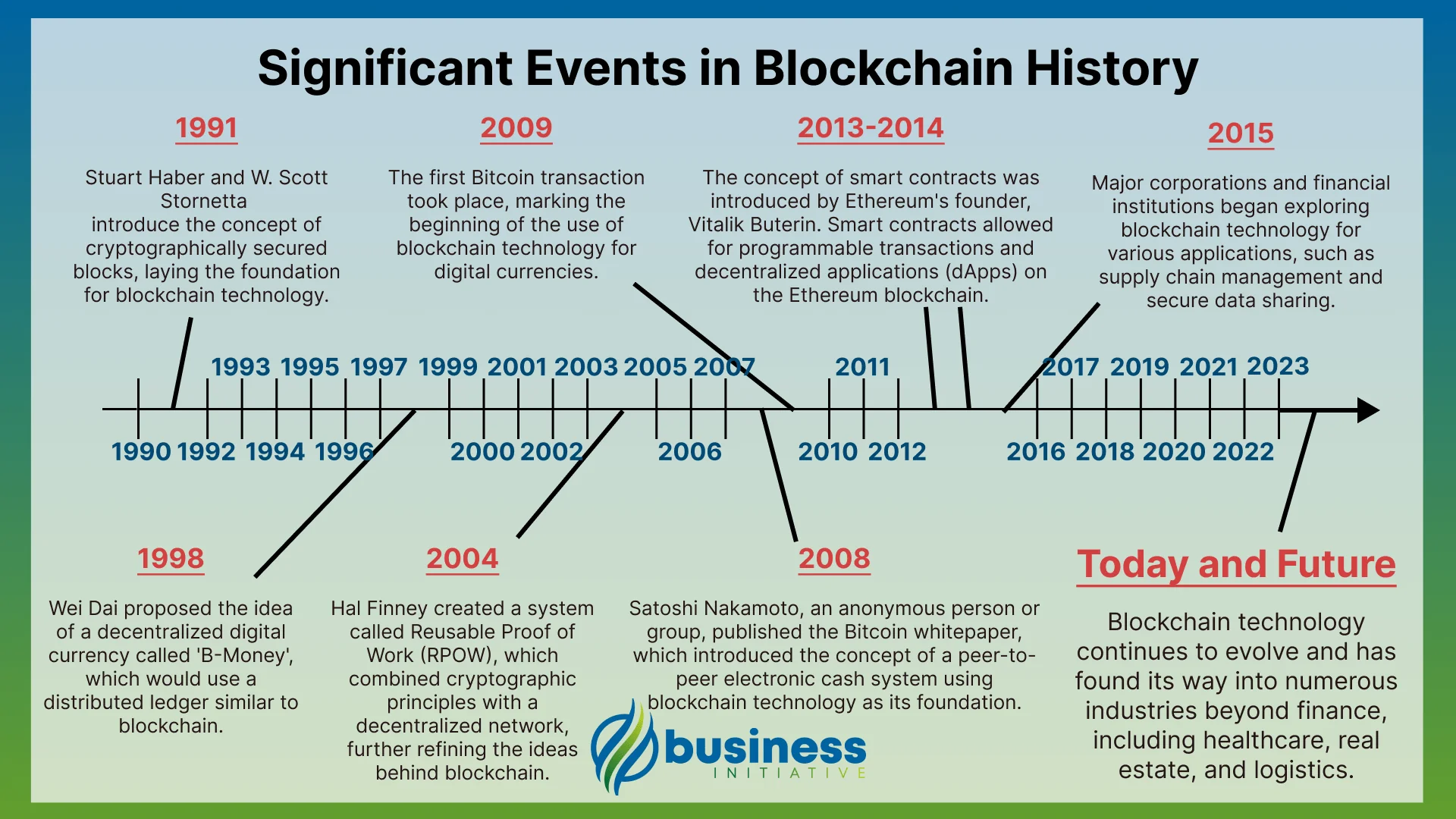Welcome to the world of blockchain technology and its potential impact on businesses across various industries.
In this article, we will explore the fundamentals of blockchain, its numerous applications, and how it can revolutionize the way we conduct business.
 Key Takeaways
Key Takeaways
- Decentralization and Security: Blockchain technology offers a decentralized structure, eliminating the need for intermediaries and increasing security through advanced cryptography.
- Transparency and Trust: Public blockchains offer a transparent and tamper-proof system, promoting trust among users and stakeholders.
- Efficiency and Cost Reduction: By automating processes and removing middlemen, blockchain technology can streamline business operations and significantly reduce costs.
- Smart Contracts: These self-executing contracts with predefined conditions can automate transactions, minimizing human intervention and potential errors.
- Cross-Industry Applications: Blockchain technology has far-reaching implications across various industries such as finance, supply chain management, healthcare, real estate, and more.
By delving into this cutting-edge technology, you’ll gain valuable insights that can help you make informed decisions for your own business.
Throughout this article, you’ll discover how blockchain offers enhanced security, transparency, and efficiency to various business processes.
We will also discuss real-world examples of companies leveraging the power of blockchain to streamline operations and create innovative solutions.
 Table of Contents
Table of Contents
By understanding these concepts and their practical implications, you’ll be better equipped to harness the benefits of blockchain in business and discover what makes a blockchain system attractive to business firms.
So let’s embark on this exciting journey together and unlock new opportunities for growth and success with the blockchain.

Unlock Blockchain Technology
Blockchain is a decentralized, distributed ledger technology that securely records transactions across multiple nodes.
It operates as a series of connected blocks, each containing a list of transactions.
When new transactions occur, they are added to the most recent block. Once a block reaches its maximum capacity, a new block is created and connected to the previous one, forming a chain.

Main features of blockchain technology:
🔑 Decentralization: Blockchain operates on a peer-to-peer network where each node stores a copy of the ledger, eliminating the need for central authorities or intermediaries.
🔑 Security: Transactions are cryptographically secured, making it difficult for anyone to tamper with or alter the data.
🔑 Transparency: Every node in the network has access to the entire transaction history, promoting trust and accountability.
🔑 Immutability: Once a transaction is recorded and verified on the blockchain, it cannot be altered or removed.
A Brief History of Blockchain Technology
Blockchain technology has its roots in the early 1990s, but it wasn’t until 2008 that it gained significant attention.
Here is a glimpse into the major historical events in the development of the blockchain:

Beyond Digital Currency: Blockchain Applications in Tomorrow’s Business Landscape
Blockchain technology has emerged as a transformative force in the contemporary business landscape, offering blockchain business solutions that extend far beyond digital currencies.
Its decentralized, secure, and transparent nature offers numerous benefits that are increasingly being recognized and harnessed by various industries.
Here are some key ways blockchain for businesses is creating new opportunities and streamlining operations:
-
Supply Chain Management:
Blockchain technology can significantly improve supply chain management by providing end-to-end visibility, traceability, transparency, and accountability.
Through a decentralized ledger, businesses can track products from their origin to the final consumer, ensuring authenticity, identifying bottlenecks, and preventing fraud or counterfeit goods from entering the market.
-
Smart Contracts:
These self-executing contracts with embedded rules represent one of the most promising blockchain use cases for modern enterprises, reducing manual intervention and increasing efficiency.
Smart contracts automatically execute actions when predefined conditions are met, eliminating intermediaries and reducing costs associated with contract enforcement.
They have applications in industries like insurance, real estate, and finance, streamlining operations such as payment processing, legal agreements, and insurance claims.
-
Financial Transactions:
Blockchain technology enables faster and cheaper cross-border transactions without intermediaries, demonstrating how blockchain can contribute to the financial industry and streamline processes while lowering fees.
Additionally, it facilitates more secure and efficient trade finance solutions by reducing paperwork and automating processes.
-
Data Security & Privacy:
The decentralized nature of blockchain ensures that data is stored across multiple nodes, making it highly resistant to hacks or data breaches.
This enhanced security can help protect sensitive business information and maintain customer trust.
-
Decentralized Finance (DeFi):
Decentralized finance (DeFi) utilizes blockchain technology to create an open-source financial ecosystem without relying on traditional banks or financial institutions.
DeFi allows businesses to access loans, earn interest on deposits, trade assets, and manage risk through decentralized platforms.
-
Identity Management:
Blockchain technology enables secure digital identity management for individuals and businesses by allowing them to store their identity data on a decentralized network.
This approach helps prevent identity theft, streamlines KYC (Know Your Customer) processes, and bolsters data privacy, enhancing privacy protection while simplifying identity verification for various business transactions.
-
Decentralized Applications (dApps):
Businesses can develop dApps on blockchain platforms to provide decentralized services that are not controlled by a single entity.
This opens up new opportunities for innovative business models that prioritize user privacy and control.
- Tokenization of Assets: Tokenization involves converting physical or digital assets into digital tokens that represent ownership rights.
By leveraging blockchain technology, businesses can tokenize real estate properties, intellectual property rights, or even company shares.
This process provides increased liquidity, fractional ownership opportunities, and easier transferability of assets.
The importance of blockchain in the modern business landscape is undeniable as it continues to disrupt traditional practices with its unique capabilities.
Embracing blockchain technology can provide businesses with a competitive edge, enhance security, and streamline operations across various sectors, making the importance of blockchain technology in business increasingly clear.
Understanding the Core Components of Blockchain Technology
Blockchain technology is built upon three fundamental components that work together to create a secure, decentralized, and efficient system.
These core components are:
- Distributed Ledger,
- Cryptography,
- and Consensus Mechanisms

1. Distributed Ledger
A distributed ledger is a database that is shared and synchronized across multiple nodes in a network.
Each node maintains an identical copy of the ledger, ensuring transparency and eliminating the need for central authorities or intermediaries.
When a new transaction is recorded, it is verified by the nodes in the network and added to the ledger.
The distribution of the ledger makes it highly resistant to manipulation or tampering, as any changes would need to be made simultaneously on all copies.
2. Cryptography
Cryptography is the practice of securing communication and data through mathematical algorithms and encryption techniques.
In a blockchain, it is used to ensure the integrity and confidentiality of transactions by:
- Protecting the identity of participants through public and private keys:
Each user has a public key (akin to an account number) that is visible to everyone on the network, while their private key (similar to a password) remains secret.
Transactions are signed with the private key, providing proof of ownership without revealing the user’s identity.
- Hash functions: A hash function takes an input (such as transaction data) and produces a fixed-length output called a hash.
Any change in input data will result in a completely different hash.
This property makes hashes useful for verifying data integrity.
In a blockchain, each block contains a unique hash that depends on its contents and the hash of the previous block, creating a secure chain of blocks.
- Digital signatures:
Users can sign transactions digitally using their private keys to authenticate their identity and prove they authorized the transaction.
3. Consensus Mechanism
A consensus mechanism is a set of rules that determine how the nodes in a blockchain network agree on the validity of transactions and the state of the ledger.
As there is no central authority, a consensus protocol ensures that all nodes come to an agreement on the contents of the distributed ledger.
There are several consensus mechanisms used in different blockchain networks, such as:
- Proof of Work (PoW): Utilized by Bitcoin, PoW requires nodes (called miners) to solve complex mathematical puzzles to validate transactions and add a new block.
The first miner to solve the puzzle gets rewarded with cryptocurrency.
- Proof of Stake (PoS): In PoS, validators are chosen based on the number of tokens they hold (their stake) and then take turns validating transactions.
This method is more energy-efficient than PoW and is used by networks like Ethereum 2.0 and Cardano.
- Delegated Proof of Stake (DPoS): DPoS involves token holders voting for a limited number of delegates who are responsible for validating transactions and maintaining the network.
This approach aims to improve scalability and efficiency.
These core components work in tandem to create the secure, decentralized, and transparent nature of blockchain technology, making it suitable for a wide range of applications across various industries.
Types of Blockchain Networks
There are three main types of blockchain networks, each with distinct features and use cases. These types include
- Public Blockchains,
- Private Blockchains,
- and Consortium Blockchains

1. Public Blockchains
Public blockchains are open, decentralized networks that anyone can join and participate in.
They allow users to read, write, and audit transactions without requiring permission from a central authority.
Key features of public blockchains include:
-
Decentralization: Public blockchains are maintained by a large number of nodes distributed across the globe, ensuring that no single entity has control over the network.
-
Permissionless: Anyone can join the network and contribute to the consensus process, either by mining (in Proof of Work systems) or staking (in Proof of Stake systems).
-
Transparency: All transactions on public blockchains are visible to everyone in the network, fostering trust and accountability.
Examples of public blockchains include Bitcoin, Ethereum, and Litecoin.
These networks are primarily used for decentralized digital currencies and open-source decentralized applications (dApps).
2. Private Blockchains
Private blockchains are closed networks where access is restricted to specific participants who have been granted permission.
They offer greater control over the network but sacrifice some decentralization in the process.
Key features of private blockchains include:
-
Centralized control: A central authority or organization manages the network and determines who can participate in it.
-
Permissioned: Access to the network is granted only to approved participants who meet specific criteria set by the controlling entity.
-
Enhanced privacy: Transactions in private blockchains may not be publicly visible, offering increased privacy for users.
Private blockchains are often used by businesses and organizations looking to leverage blockchain technology while retaining control over their data and network participants.
Examples include Hyperledger Fabric and R3 Corda.
3. Consortium Blockchains
Consortium blockchains, also known as federated blockchains, are a hybrid between public and private blockchains.
They are controlled by a group of pre-selected organizations or entities that share the responsibility of maintaining the network and validating transactions.
Characteristics of consortium blockchains include:
-
Shared control: Multiple trusted entities collaborate to maintain the network, ensuring that no single organization has complete control.
-
Permissioned: Access to the network is restricted to authorized participants who have been vetted by the controlling entities.
-
Efficiency: Consortium blockchains often have faster transaction processing times and lower energy consumption compared to public blockchains.
Consortium blockchains are commonly used in sectors where multiple organizations need to collaborate and share information securely, such as finance, supply chain management, and healthcare. Examples include Quorum and Ripple.
In summary, each type of blockchain network offers its own set of advantages and trade-offs, depending on the desired level of decentralization, privacy, and control required for a specific use case.
The Key Benefits of Using Blockchain in Your Business
Blockchain technology offers numerous advantages that can revolutionize the way businesses operate, enhancing security, efficiency, traceability, and cost reduction.

1. Enhanced Security
Blockchain’s unique characteristics contribute to its robust security features:
-
Cryptographic protection: Transactions are secured using cryptographic techniques such as public-key cryptography and digital signatures, ensuring data confidentiality and integrity.
-
Decentralization: Data is stored across a distributed network of nodes, making it resistant to tampering or single points of failure. This reduces the risk of hacks and data breaches.
By leveraging these features, businesses can protect sensitive information and build trust with their customers.
2. Increased Efficiency and Speed
Blockchain technology streamlines various processes, leading to improved efficiency and speed:
-
Automation through smart contracts: These programmable contracts execute predefined actions when specific conditions are met. Smart contracts can automate processes such as payments, contract enforcement, and supply chain management.
-
Streamlined processes: By eliminating intermediaries and enabling peer-to-peer transactions, blockchain networks can accelerate processes like cross-border payments, trade finance, and document verification.
These efficiency improvements can result in faster operations, reduced turnaround times, and increased productivity for businesses.
3. Improved Traceability and Transparency
Blockchain technology enhances traceability and transparency through its immutable ledger:
-
Immutable ledger: Once a transaction is recorded on the blockchain, it cannot be altered or removed. This ensures a permanent record of all transactions that can be easily audited.
-
Auditability: The transparent nature of blockchain allows for real-time tracking of assets and transactions by all network participants. This facilitates better decision-making and promotes trust among stakeholders.
Businesses can leverage these features to improve supply chain traceability, ensure regulatory compliance, prevent fraud, and enhance overall accountability.
4. Cost Reduction
Implementing blockchain technology can lead to significant cost savings for businesses:
-
Elimination of intermediaries: Blockchain enables direct transactions between parties, removing the need for intermediaries like banks or notaries. This reduces transaction fees and other associated costs.
-
Automated processes: Automation through smart contracts and streamlined processes can reduce manual intervention and administrative overhead, leading to lower operational costs.
By adopting blockchain solutions, businesses can optimize their financial operations, minimize expenses, and ultimately increase profitability.
In conclusion, understanding what are the benefits of blockchain for business reveals how this technology offers companies a competitive edge by enhancing security, efficiency, traceability, and cost reduction across various industries.
Blockchain Applications in Various Business Sectors
The versatility of blockchain and business integration allows it to be applied across multiple sectors, with blockchain applications spanning far beyond hi-tech industries to revolutionize traditional practices.

1. Financial Services
The advent of blockchain technology has revolutionized the financial sector, paving the way for innovative applications such as:
- Digital currencies (e.g., Bitcoin, Ethereum): Decentralized digital currencies, also known as cryptocurrencies, provide an alternative form of payment and have gained widespread adoption (source).
As of Q2 2021, there are over 70 million blockchain wallet users worldwide (source).
- Cross-border payments: Blockchain enables faster, cheaper, and more secure international transactions without the need for intermediaries (source).
In 2020, global remittances reached $540 billion despite the COVID-19 pandemic’s economic impact (source).
- Trade finance: Blockchain can streamline trade finance processes by reducing paperwork and automating transactions, making them more efficient and transparent (source).
According to a Deloitte study, blockchain has the potential to reduce operational costs in trade finance by 50% to 70% (source).
2. Supply Chain Management
The transformative power of blockchain technology in enhancing supply chain management has gained significant recognition.
Its diverse applications include:
- Provenance tracking: Tracking the movement of goods from their origin to the final consumer ensures transparency and accountability throughout the supply chain (source).
Walmart, for instance, has been using IBM’s Food Trust blockchain to trace products from over 25 food suppliers, reducing the time taken to trace food items from 7 days to 2.2 seconds (source).
- Quality assurance: Blockchain can help maintain quality control by recording important information about products at each stage of the supply chain (source).
A World Economic Forum study found that 30% of companies are actively piloting blockchain in their supply chains for improved traceability and transparency (source).
- Reduction of fraud: The immutable nature of blockchain makes it difficult to tamper with data or counterfeit goods, minimizing fraud within the supply chain (source).
The global supply chain management market is expected to reach $19.3 billion by 2028.
However, a 2018 report by the Association of Certified Fraud Examiners revealed that fraud causes losses of over $7 billion annually worldwide (source).
3. Real Estate

The real estate sector stands on the cusp of a major transformation, as blockchain technology promises to revolutionize various aspects of the industry.
Some potential blockchain business opportunities include:
- Property ownership verification: A blockchain-based land registry can provide a secure and transparent record of property ownership, simplifying the verification process (source).
In countries like Georgia and Sweden, pilot projects have successfully demonstrated the benefits of blockchain for land registries (source).
- Tokenization of assets: Tokenizing real estate assets on the blockchain can enable fractional ownership and make property investment more accessible (source).
The global real estate market is estimated to be worth $228 trillion, indicating the vast potential for tokenization in this sector (source).
- Streamlined transactions: Using smart contracts for real estate transactions can automate processes, reduce paperwork, and lower costs (source).
Research indicates that over 25% of title reports have defects, highlighting the need for a technological transformation in the real estate sector.
Smart contracts in real estate offer a promising solution, enhancing both efficiency and security in property transactions (source).
4. Healthcare
The potential of blockchain technology in the healthcare sector is vast and multifaceted.
Key applications include:
- Patient data management: A decentralized patient record system can enhance data security, interoperability, and accessibility while maintaining privacy (source).
Research estimates that improved data sharing could save the US healthcare system up to $1.9 billion annually (source).
- Drug supply chain traceability: Blockchain can ensure the authenticity and safety of pharmaceutical products by tracking them throughout the supply chain, addressing challenges like lack of transparency, tracking difficulties, and counterfeit drug prevention (source).
The World Health Organization (WHO) reports that at least 1 in 10 medicines in low- and middle-income countries are substandard or falsified, emphasizing the critical need for blockchain-based traceability solutions (source).
- Clinical trial management: Blockchain can improve clinical trial management by streamlining data collection, maintaining data integrity, and ensuring transparency (source).
A study found that only 20% of clinical trials are completed on time, with delays costing up to $8 million per day, highlighting the potential benefits of blockchain in this area (source).
5. Insurance
Blockchain technology holds the potential to revolutionize the insurance industry by offering innovative solutions to various challenges.

Some key areas where blockchain business networks can make a significant impact include:
- Fraud detection and prevention: The transparent and immutable nature of blockchain can help detect and prevent fraudulent activities in insurance claims (source).
An estimated $308.6 billion annually is lost to insurance fraud in the U.S., costing consumers an average of $900 per person in increased premiums (source). Blockchain technology could play a significant role in combating this issue.
- Claims management: Smart contracts can automate claims processing, reducing manual intervention and improving efficiency (source).
The global insurance claims management market is expected to reach $14.7 billion by 2026, with blockchain solutions potentially driving part of this growth (source).
- Risk assessment: Blockchain can enable more accurate risk assessment by providing secure and transparent access to relevant data across multiple parties (source).
The global risk management market is projected to reach $18.5 billion by 2021, showcasing the potential for blockchain applications in this sector (source).
In conclusion, blockchain technology has far-reaching applications across various business sectors, with examples of blockchain in business revolutionizing traditional practices and offering numerous benefits.
Challenges and Concerns in Implementing Blockchain Technology
While implementing blockchain in business offers numerous benefits, organizations also face certain challenges and concerns that need to be addressed for widespread adoption.

1. Scalability
As blockchain networks grow, they face scalability issues that impact their performance:
- Limited transaction throughput: Existing public blockchains like Bitcoin and Ethereum have limited transaction processing capacity.
For example, Bitcoin can process around 7 transactions per second (tps), while Ethereum handles around 30 tps. In comparison, Visa can handle up to 65,000 tps (source).
- Energy consumption: Proof of Work (PoW) consensus mechanisms used in some blockchains, such as Bitcoin, are energy-intensive and contribute to environmental concerns.
In November 2021, the Cambridge Centre for Alternative Finance estimated that Bitcoin’s annual energy consumption was around 115 TWh, which is comparable to the energy consumption of a small country like the Netherlands (source).
Several solutions are being developed to address these scalability issues, including layer 2 solutions like the Lightning Network and alternative consensus mechanisms like Proof of Stake (PoS).
2. Regulatory Environment
The regulatory landscape surrounding blockchain technology is still evolving, resulting in challenges for businesses and users:
- Legal uncertainty: As regulators grapple with the implications of blockchain technology, there is a lack of clear legal frameworks and guidelines in many jurisdictions.
For example, cryptocurrency regulations vary significantly across countries, with some embracing the technology while others impose strict restrictions or outright bans (source).
- Compliance challenges: Businesses implementing blockchain solutions must navigate complex regulatory requirements related to data privacy, cross-border transactions, and anti-money laundering (AML) measures.
A PwC survey found that 48% of companies exploring blockchain cited regulatory uncertainty as a barrier to adoption (source).
As the technology matures, regulators worldwide are expected to develop more comprehensive and harmonized legal frameworks.
3. Security and Privacy Concerns
Despite its inherent security features, blockchain technology is not immune to threats and privacy concerns:
- Vulnerability to attacks: While blockchains are generally secure, they can be susceptible to attacks like 51% attacks (where a single entity gains control of the majority of the network’s mining power) or smart contract vulnerabilities.
In January 2019, Ethereum Classic suffered a 51% attack that resulted in the theft of over $1 million worth of cryptocurrency (source).
- Data protection issues: Ensuring data privacy on public blockchains can be challenging, as transactions are often visible to all network participants.
This raises concerns about complying with privacy regulations like the General Data Protection Regulation (GDPR).
For instance, GDPR’s “right to be forgotten” contradicts the immutability principle of blockchain technology (source).
Efforts are underway to develop more robust security measures and privacy-preserving techniques for blockchain networks, such as zero-knowledge proofs and confidential transactions.
In conclusion, addressing these challenges and concerns is crucial for the successful implementation and adoption of blockchain technology across various industries.
Successful Blockchain Implementations in Major Businesses
1. Walmart’s Food Traceability Solution
Walmart, one of the world’s largest retailers, has implemented a blockchain-based food traceability solution to enhance the transparency and efficiency of its supply chain.
In partnership with IBM, Walmart developed the IBM Food Trust platform, which uses blockchain technology to track food products from their origin to store shelves.

The system helps improve food safety by enabling faster identification and removal of contaminated products, reducing the risk of foodborne illnesses.
Walmart’s blockchain initiative has demonstrated significant improvements in traceability, reducing the time taken to trace food items from 7 days to just 2.2 seconds (source).
2. De Beers’ Diamond Supply Chain Tracking
De Beers, the world’s largest diamond producer, has utilized blockchain technology to track diamonds throughout their supply chain.
The company’s Tracr platform records and traces each diamond’s journey from the mine to the customer, ensuring transparency, authenticity, and ethical sourcing.

By providing a tamper-proof digital record of diamonds’ provenance and ownership history, Tracr helps combat issues such as conflict diamonds and counterfeiting.
The platform has been successfully piloted with over 100 high-value diamonds tracked across the supply chain (source).
3. Maersk’s Blockchain-Based Shipping Platform
Maersk, the world’s largest shipping company, has partnered with IBM to create a blockchain-based shipping platform called TradeLens.
The platform aims to streamline the global shipping industry by digitizing and automating documentation processes, enhancing transparency, and promoting collaboration among supply chain participants.

TradeLens provides real-time access to shipping data, enabling more efficient tracking of cargo movements and reducing the potential for errors and fraud.
Since its launch in 2018, TradeLens has attracted over 100 participants, including carriers, ports, terminal operators, and customs authorities, and has processed millions of shipping events (source).
These successful implementations demonstrate the business of blockchain and its potential to transform various industries by improving efficiency, transparency, and security in their respective supply chains.
FAQs - Frequently Asked Questions About Using Blockchain in Your Company

What is blockchain technology and how does it work?
Blockchain is a decentralized digital ledger that records transactions across multiple computers.
It creates an unchangeable chain of data blocks secured by cryptography.
Learn More...
Blockchain operates as a series of connected blocks, each containing a list of transactions.
When new transactions occur, they are added to the most recent block.
Once a block reaches its maximum capacity, a new block is created and connected to the previous one, forming a chain.
The technology is built upon three fundamental components:
- Distributed Ledger - a database shared across multiple nodes
- Cryptography - mathematical algorithms that secure transactions
- Consensus Mechanisms - rules that determine transaction validity
Each node in the network maintains an identical copy of the ledger, ensuring transparency and eliminating the need for central authorities.
The distribution makes it highly resistant to manipulation, as changes would need to be made simultaneously on all copies.
How can blockchain benefit my business operations?
Blockchain enhances security, reduces costs, and increases transparency in business processes.
Learn More...
Blockchain technology offers four key benefits that can revolutionize business operations:
- Enhanced Security - Cryptographic protection and decentralized data storage reduce hack risks
- Increased Efficiency - Smart contracts automate processes and eliminate intermediaries
- Improved Traceability - Immutable ledger provides permanent audit trails
- Cost Reduction - Direct transactions remove middlemen and reduce fees
Businesses can leverage these features to protect sensitive information and build customer trust.
Smart contracts can automate payments, contract enforcement, and supply chain management.
The transparent nature allows real-time tracking of assets and transactions by all network participants.
Companies can optimize financial operations, minimize expenses, and ultimately increase profitability.
What industries are using blockchain technology successfully?
Major industries include finance, supply chain, healthcare, real estate, and insurance.
Learn More...
Blockchain technology has been successfully implemented across multiple business sectors:
- Financial Services - Digital currencies, cross-border payments, and trade finance
- Supply Chain Management - Provenance tracking, quality assurance, and fraud reduction
- Healthcare - Patient data management, drug traceability, and clinical trials
- Real Estate - Property ownership verification, asset tokenization, and streamlined transactions
- Insurance - Fraud detection, claims management, and risk assessment
Over 70 million people worldwide use blockchain wallets as of Q2 2021.
Walmart reduced food tracing time from 7 days to 2.2 seconds using IBM's Food Trust blockchain.
30% of companies are actively piloting blockchain in their supply chains for improved traceability.
The global insurance claims management market is expected to reach $14.7 billion by 2026, with blockchain solutions driving growth.
What are smart contracts and how do they work?
Smart contracts are self-executing contracts with predefined conditions that automatically execute when terms are met.
Learn More...
Smart contracts are programmable contracts that execute predefined actions when specific conditions are met.
They eliminate intermediaries and reduce costs associated with contract enforcement.
These contracts have applications across multiple industries:
- Insurance - Automated claims processing and policy management
- Real Estate - Property transfers and rental agreements
- Finance - Payment processing and loan agreements
- Supply Chain - Automatic payments upon delivery confirmation
Smart contracts can automate processes such as payments, contract enforcement, and supply chain management.
They minimize human intervention and potential errors while increasing efficiency.
Research indicates that over 25% of title reports have defects, highlighting the need for smart contract solutions in real estate.
By automating processes, businesses can reduce manual intervention and administrative overhead, leading to lower operational costs.
What are the main challenges of implementing blockchain technology?
Key challenges include scalability limitations, regulatory uncertainty, and security concerns.
Learn More...
While blockchain offers numerous benefits, businesses face several implementation challenges:
- Scalability Issues - Bitcoin processes 7 transactions per second vs Visa's 65,000 tps
- Energy Consumption - Bitcoin's annual consumption equals that of the Netherlands (115 TWh)
- Regulatory Uncertainty - 48% of companies cite regulatory barriers as adoption obstacles
- Security Vulnerabilities - Risk of 51% attacks and smart contract flaws
- Privacy Concerns - GDPR's 'right to be forgotten' conflicts with blockchain immutability
Several solutions are being developed to address scalability issues, including layer 2 solutions like the Lightning Network.
Alternative consensus mechanisms like Proof of Stake (PoS) are more energy-efficient than Proof of Work.
As the technology matures, regulators worldwide are developing more comprehensive legal frameworks.
Efforts are underway to develop privacy-preserving techniques such as zero-knowledge proofs and confidential transactions.
How much does insurance fraud cost and can blockchain help?
Insurance fraud costs $308.6 billion annually in the U.S., costing consumers $900 per person in increased premiums.
Learn More...
Insurance fraud represents a massive financial burden on the U.S. economy and individual consumers.
The transparent and immutable nature of blockchain can help detect and prevent fraudulent activities in insurance claims.
Blockchain technology offers several solutions to combat insurance fraud:
- Fraud Detection - Immutable records make it difficult to falsify claims
- Claims Management - Smart contracts automate processing and reduce manual errors
- Risk Assessment - Secure data sharing across parties enables better risk evaluation
- Data Integrity - Tamper-proof records ensure claim authenticity
The global insurance claims management market is expected to reach $14.7 billion by 2026.
Blockchain solutions could potentially drive significant growth in this sector by reducing fraud and improving efficiency.
The global risk management market is projected to reach $18.5 billion, showcasing blockchain's potential in this area.
What is the difference between public, private, and consortium blockchains?
Public blockchains are open to everyone, private are restricted to specific users, and consortium are controlled by selected organizations.
Learn More...
There are three main types of blockchain networks, each serving different business needs:
- Public Blockchains - Open, decentralized networks like Bitcoin and Ethereum
- Private Blockchains - Closed networks with restricted access like Hyperledger Fabric
- Consortium Blockchains - Hybrid networks controlled by pre-selected organizations like Quorum
Public blockchains offer complete decentralization and transparency but may have slower transaction speeds.
Private blockchains provide greater control and privacy but sacrifice some decentralization benefits.
Consortium blockchains balance control and decentralization, making them ideal for industry collaborations.
Public blockchains are primarily used for digital currencies and open-source applications.
Private blockchains are often used by businesses wanting to leverage blockchain while maintaining data control.
Consortium blockchains are commonly used in finance, supply chain management, and healthcare where multiple organizations need to collaborate securely.
How is blockchain being used in supply chain management?
Blockchain provides end-to-end visibility, tracks product origins, and prevents fraud in supply chains.
Learn More...
Blockchain technology significantly improves supply chain management through several key applications:
- Provenance Tracking - Traces products from origin to final consumer
- Quality Assurance - Records important product information at each stage
- Fraud Reduction - Immutable records make counterfeiting difficult
- Transparency - All participants can access transaction history
Walmart uses IBM's Food Trust blockchain to trace products from over 25 food suppliers.
This implementation reduced food tracing time from 7 days to just 2.2 seconds.
30% of companies are actively piloting blockchain in their supply chains for improved traceability and transparency.
The global supply chain management market is expected to reach $19.3 billion by 2028.
Fraud causes losses of over $7 billion annually worldwide, highlighting the need for blockchain solutions.
The immutable nature of blockchain makes it difficult to tamper with data or introduce counterfeit goods.
Can blockchain improve healthcare data management and drug safety?
Yes, blockchain enhances patient data security, enables drug traceability, and improves clinical trial integrity.
Learn More...
Blockchain technology offers significant improvements to healthcare through multiple applications:
- Patient Data Management - Decentralized records enhance security and accessibility
- Drug Supply Chain Traceability - Ensures pharmaceutical authenticity and safety
- Clinical Trial Management - Maintains data integrity and transparency
- Interoperability - Enables secure data sharing between healthcare providers
Research estimates that improved data sharing could save the U.S. healthcare system up to $1.9 billion annually.
The World Health Organization reports that at least 1 in 10 medicines in low- and middle-income countries are substandard or falsified.
Blockchain can address challenges like lack of transparency, tracking difficulties, and counterfeit drug prevention.
Only 20% of clinical trials are completed on time, with delays costing up to $8 million per day.
Blockchain can streamline data collection, maintain data integrity, and ensure transparency in clinical trials.
The technology helps prevent identity theft, streamlines KYC processes, and enhances privacy protection in healthcare transactions.
Embracing the Future of Business…
Blockchain technology holds immense potential to revolutionize various industries by providing enhanced security, transparency, and efficiency.
As we have seen in this article, businesses across diverse sectors such as supply chain management, real estate, healthcare, insurance, and major enterprises like Walmart, De Beers, and Maersk have successfully implemented blockchain solutions to address key challenges.
However, widespread adoption of blockchain technology also faces hurdles such as scalability, regulatory uncertainty, and security and privacy concerns.
As these challenges are addressed over time, we can expect an increasing number of businesses to embrace blockchain solutions, leading to more innovative blockchain business ideas and a transformative impact on the global business landscape.
Take the Initiative and leverage the power of blockchain for your business by scheduling a consultation call with Business Initiative today!
Have any questions?
Reach out here or send Business Initiative a message @BisInitiative on X
Join us on this exciting journey as we explore the future of blockchain technology in the business world.
Stay up-to-date with the latest developments in the blockchain industry by subscribing to the Business Initiative Newsletter.
Sources
- Statista: Blockchain Wallet Users Worldwide
- World Bank: Remittances
- World Bank: COVID-19 Crisis Through a Migration Lens
- Deloitte: Blockchain Applications in Trade Finance
- IBM Food Trust
- IBM: Walmart Food Trust Case Study
- Accenture: Supply Chain Strategy
- World Economic Forum: Inclusive Deployment of Blockchain
- Silicon Digest: The Role of Blockchain in Combating Counterfeit Goods
- The Best of Blockchain: How Blockchain Prevents Supply Chain Fraud
- McKinsey & Company: Blockchain in Construction - A Blueprint for Disruption
- Web3 Insights: Tokenized Real Estate on Blockchain
- Savills World Research: Global Real Estate Market Size
- Cambridge Judge Business School: Smart Contracts and Real Estate Transactions
- Primior: Smart Contracts in Real Estate
- NCBI: Blockchain for Healthcare
- PubMed: Potential Savings from Data Sharing in Healthcare
- PMC: Drug Supply Chain Traceability
- WHO: Substandard and Falsified Medical Products
- NCBI: Blockchain in Clinical Trials
- McKinsey & Company: Blockchain in Insurance - Opportunity or Threat?
- Forbes Advisor: Insurance Fraud Statistics
- Deloitte: Blockchain Applications in Insurance
- GlobeNewswire: Global Insurance Claims Management Markets
- IEEE Xplore: Blockchain for Risk Management
- BuiltIn: Blockchain
- MarketsandMarkets: Operational Risk Management Market
- CoinDesk: Scaling Bitcoin and Ethereum
- Cambridge Centre for Alternative Finance: Bitcoin Energy Consumption Index
- World Economic Forum: Global Cryptocurrency Regulations
- Webisoft: How to Use Blockchain In Business
- PwC: Global Blockchain Survey 2018
- European Parliament: Blockchain and the GDPR
- CoinDesk: Ethereum Classic 51% Attack
- CoinAviator: De Beers Blockchain Platform Trial
- Blockchain Council: Role of Blockchain in Modern Business Applications
- IBM: Maersk TradeLens Case Study
- IBM: Blockchain for Business


